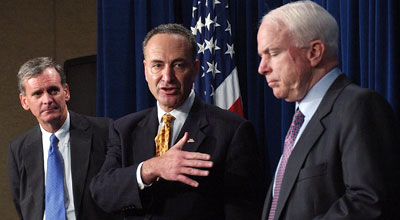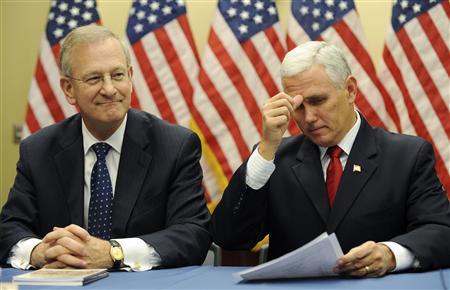Mervyn King, the Governor of the Bank of England, has come under fire from leading economists after warning that Britain risks suffering another financial crisis without reform of the country’s banks.
In an interview with The Daily Telegraph, Mervyn King said that “imbalances” in the banking system remain and are “beginning to grow again”.
But leading economists, including a former Tory advisor and the chief executive of the British Bankers' Association, have criticised his comments.
Tim Congdon, who served on the Treasury Panel of Independent Forecasters (the so-called "wise men") under the last Conservative government, called the remarks "unjustified".
He said: "The truth is the financial sector is very important to the British economy. He's been at the Bank of England for twenty years... I find it incredible that he's now attacking the structure of the industry.
"If you criticise the banks you reduce their credibility and then people worry about them. The important thing for the Governor of the Bank of England is to help them."
Angela Knight, chief executive, British Bankers' Association, said: "We view the Governor with the highest respect, but in this instance there are a number of points with which we disagree.
"The banking industry recognises that some of its number got it badly wrong during the crisis. Since then the industry has reformed radically.
"We work closely with our customers of all sizes and types and in doing so have created one of the largest financial centres in the world and a great contributor to the British economy. We achieved this together by doing our business well - not by doing it badly.
"We entirely agree that no bank should believe it can fall back on the taxpayer. The changes from top to bottom within the industry have ensured the risks are well controlled, and all banks have put recovery and resolution plans in place to answer the too-big-to-fail question and so safeguard customers and the taxpayer against the remote consequences of any future failure."
In the interview Mr King urges high street banks to take a better, longer term view towards their customers and to stop focusing on the need to “simply maximise profits next week”.
He accuses them of routinely exploiting their millions of customers. “If it’s possible [for financial services firms] to make money out of gullible or unsuspecting customers, particularly institutional customers, [they think] that is perfectly acceptable,” he says.
The Governor criticises the “weight put on the importance and value of takeovers” and raises concerns that companies with good reputations have been “destroyed” in the search for short-term profits.
Mr King expresses regret for not sounding a louder warning over his concerns before the last banking crisis.
The Governor’s remarks are a warning to George Osborne, the Chancellor, as a government commission considers whether to force high street banks to sell off their investment banking arms.
Mr Osborne is thought to be against such a plan, but Mr King is due to ultimately become responsible for banking regulation and his views are, therefore, critical.
In the interview, the Bank Governor says: “We allowed a [banking] system to build up which contained the seeds of its own destruction.
“We’ve not yet solved the 'too big to fail’ or, as I prefer to call it, the 'too important to fail’ problem.
“The concept of being too important to fail should have no place in a market economy.”
When asked whether there could be a repeat of the financial crisis, Mr King says: “Yes. The problem is still there. The search for yield goes on. Imbalances are beginning to grow again.”
Mr King, who rarely gives interviews, suggests that the culture of short-term profits and bonuses within the banks may ultimately be responsible for the problems.
He says that traditional manufacturing industries have a more “moral” way of operating.
“They care deeply about their workforce, about their customers and, above all, are proud of their products,” he says. “[With the banks] there isn’t that sense of longer term relationships.
“There’s a different attitude towards customers. Small and medium firms really notice this: they miss the people they know.”
The Governor adds that good businesses “keep a clear vision of who their customers are, and are run by people who don’t think they should simply maximise profits next week.” He says that the payment of bonuses is part of this cultural problem. “Why do banks in general want to pay bonuses?” Mr King asks. “It’s because they live in a 'too big to fail’ world in which the state will bail them out on the downside.”
Over the past 30 years, he says, “we changed Britain away from a sclerotic economy with inefficiencies and problems in labour relations. Everyone got to the point where we no longer expected government to bail us out.”
He says this changed with the banking crisis. 'But, surprise, surprise, the institutions bailed out were those at the heart of the crisis. Hedge funds were allowed to fail, 3,000 of them have gone, but banks weren’t,’ he says.
The comments will embarrass the Chancellor, who recently concluded a deal with the banks under which they would be able to resume the payment of bonuses in return for boosting lending.
Mr King does not back down from recent comments that appeared to back the Government’s strategy for reducing the deficit. Ed Balls, the shadow chancellor, recently accused the Governor of becoming too political.
Mr King said: “It is inconceivable that the Governor has no view on the size of the deficit and the need to reduce it. It would be a dereliction of duty for me not to warn. You need a credible plan to reduce it, over the lifetime of a Parliament. But it is for ministers, not for me, to say how this should be done.”
In the interview, the Governor gives little clue as to whether an interest rate rise is imminent.
Mr King says there is a “perfectly reasonable case for doing it now” but he added that increasing rates too soon would be a “futile gesture”.















